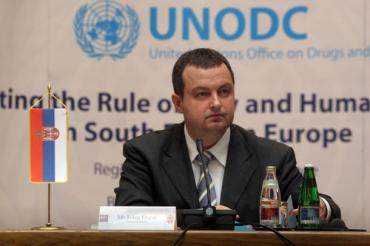 BELGRADE, BRUSSELS
BELGRADE, BRUSSELS
The European Commission has proposed the abolition of visas for Serbian citizens traveling to the EU starting from January 1, the EC announced today.
Justice and Enlargement Commissioners Jaques Barrot and Olli Rehn told a press conference in Brussels that the same recommendations had been made for Macedonia and Montenegro. Barrot said that dialogue with Bosnia-Herzegovina and Albania would continue.
A formal proposal has been sent to the EU Council of Ministers, who are due to take the final decision to place Serbia, Montenegro and Macedonia on the Schengen white list in the autumn.
“This is a historic moment in our relations with the West Balkan countries, and this moment is something we’ve been waiting for a long time, and will allow our relations to be even better in the future,” said Barrot.
He said that the EC would continue sending its verification missions to Serbia in order to ensure that the remaining conditions had been met.
“We’ll ask the Serbian government to send us a report towards the end of September on the implementation of the remaining conditions,” said Barrot.
Rehn said that this was a very important day for the people of the Western Balkans, for Europe, and for himself too.
“I believe our proposal will be accepted by all the EU member-states, once we consult with the European Parliament. When that happens, a biometric passport will be enough to travel through the Schengen signatory countries. For citizens of the Western Balkans, visa liberalization means no more waiting in front of embassies and collecting documents,” he explained.
Interior Minister Ivica Dačić said that Barrot had handed him the EC’s official decision on visa liberalization.
After meeting with the commissioner, and prior to the press conference where the commission’s decision was announced, the interior minister said that he and European Integration Office Director Milica Delević would be speaking with Rehn about meeting further conditions on the roadmap.
“We’re certain that the decision will be positive, as we’ve been working for all these months on meeting the criteria for visa liberalization, and Serbia has made progress,” he said.
According to Dačić, it was now up to Serbia to prove that it was ready to continue conducting reforms, combating organized crime and corruption, controlling state borders and the administrative line, which required cooperation with EULEX and UNMIK police.
“EC decision decisive, but not final step”
Ivica Dačić told B92 earlier today’s decision was not the final step, rather just a proposal that needed the approval of the European Parliament.
As things stand, from January 1 next year, Serbian citizens will be able to travel visa-free to Europe for the first time in 18 years. Under procedure, the final decision to scrap visas will be taken by the Council of Ministers, once the EP has its say.
Prior to today’s decision, the commissioners gave their support in principle to the proposal that visas should be scrapped for citizens of the three countries.
Under procedure, the proposal will now be forwarded to the Council of Ministers and the EP, who are likely to take the final decision in November.
“I’m delighted and I congratulate Serbian citizens on this new stage. But I repeat: we mustn’t drop our guard, there’s no room for any euphoria. The EU Council of Ministers still needs to vote and approve the EC’s unanimous decision by the end of November, and the EP has to be consulted too. But, be that as it may, we have a draft law for all the doubting Thomases—Serbia is on the list with Montenegro and Macedonia for the white Schengen from January 2010. A marvellous day for our country,” said the interior minister.
Before a final decision on visa abolition, the Serbian authorities will still have to meet a number of additional conditions outlined in the proposal. This will all be verified by a delegation of EC experts, who are due to visit Belgrade in October.
“What’s important is that in the coming period, Serbia meets a few more key criteria. That means continued good border control, document security, which means good controls. It’s clear that the EU will also seek centralization of document issuance for citizens from Kosovo,” Dačić said.
Visa abolition will not apply to people from Kosovo, even though they will receive biometric passports. Interior Minister Ivica Dačić says that it is clear that the EC has certain reserves concerning the rule of law and crime in Kosovo, but that this was a unilateral decision by the EC.
“As far as we’re concerned, we believe that all Serbian citizens should be entitled to it. They’ll all be entitled to passports. We’ll see what the EC’s definitive decision will be,” said the minister.
The EC justifies this decision on the basis that Serbian MUP and other authorities do not have access to Kosovo territory to check the particulars of passport applicants. They cite the prevention of illegal immigration from Kosovo and the threat of the spread of organized crime networks as the main reasons for the decision.
Speaking to B92, Deputy Prime Minister Božidar Đelić portrayed the EC’s decision as the fall of the “visa Bastille”, given that it was taken on the same day as French Republic Day. Đelić warned that there was no room for euphoria, as the decision was still not final.
“This is a decisive step in our struggle for the white Schengen, we mustn’t rest on our laurels, as this proposal now goes in two directions,” stressed Đelić .
“It’s up to us to continue the reforms, to finish what we began so superbly and to ensure for our citizens that visas are abolished 17 years after their introduction, to ensure that the final sanctions are scrapped, so that citizens can receive key freedoms, European freedoms, and that’s freedom of movement,” said Đelić.
October is an important time for implementing the remaining measures, because the EP will have to vote on the proposal by the end of October, and the Council of Ministers is due to give its final word in November.
The European Stability Initiative (ESI) has commended the EC’s recommendation, but stresses that it is only a proposal that EU members could alter.
The director of ESI’s White Shengen project stated that Bosnia-Herzegovina and Albania could receive the same proposal from the EC, provided they meet their remaining roadmap conditions.
 Eurasia Press & News
Eurasia Press & News



